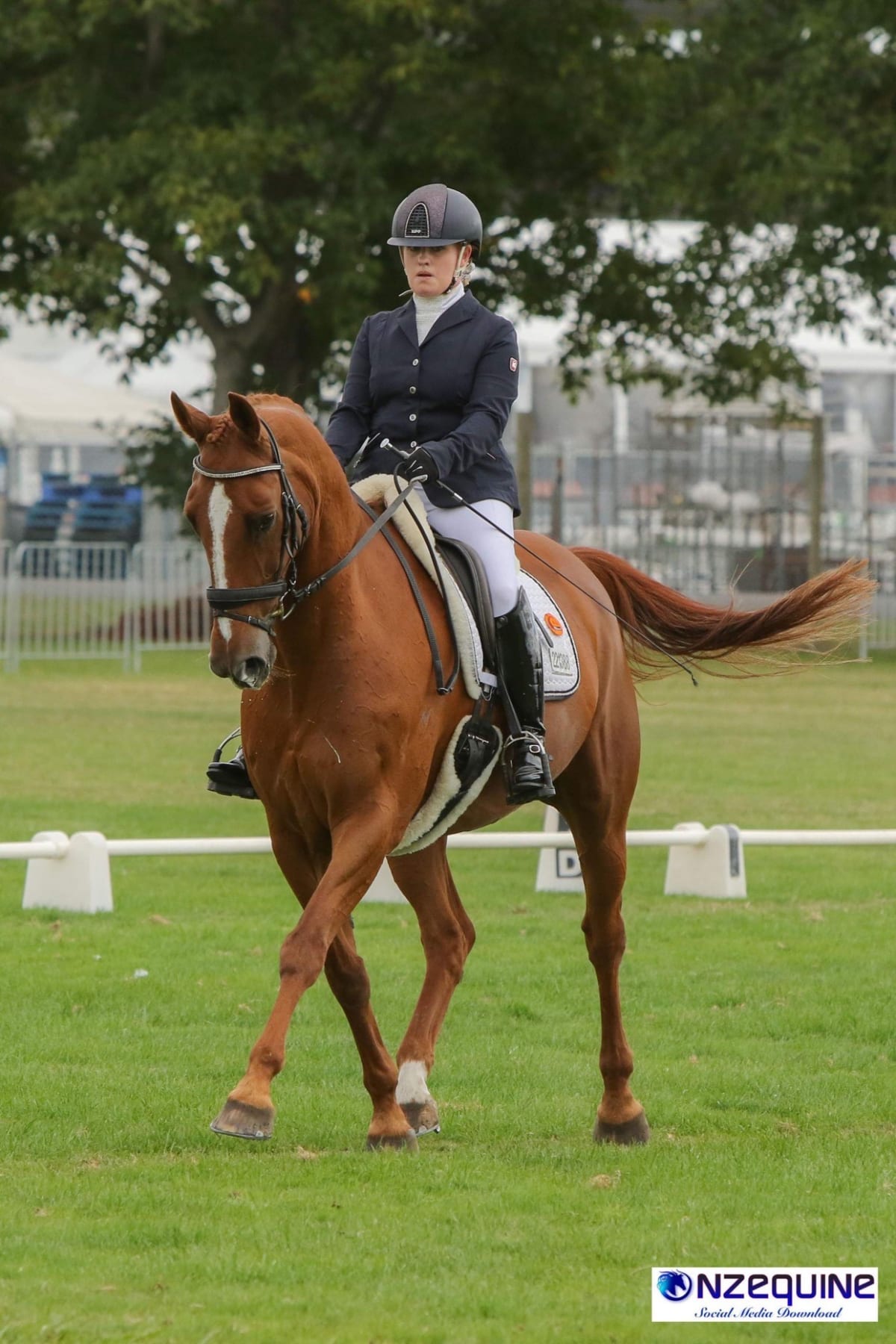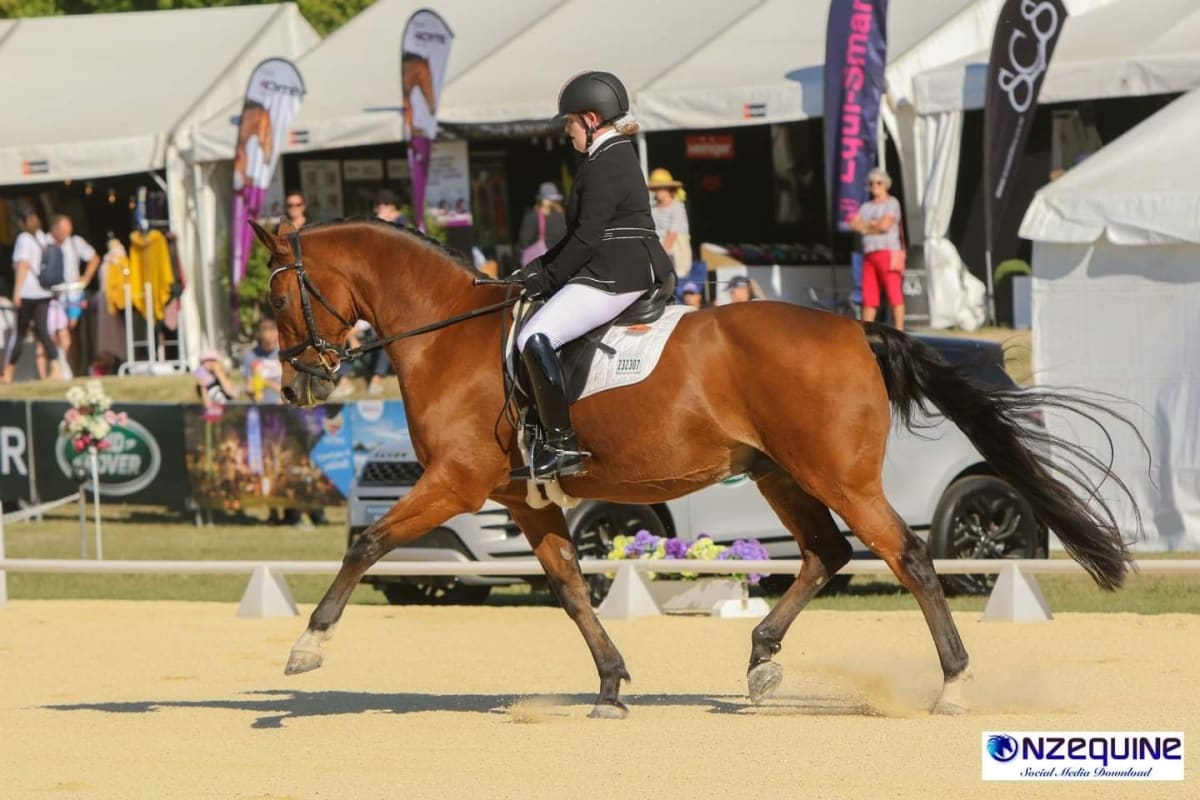Louise Duncan Defies Huge Odds on Ride to Tokyo
LockerRoom – paralympics
Once close to death, Louise Duncan has overcome the severe impacts of meningococcal meningitis and is back in the saddle – riding dressage for New Zealand and on the verge of the Tokyo Paralympics.
In her last year at secondary school, Louise Duncan’s life changed overnight.
While sitting at home in Levin one evening, the then 17-year-old mentioned to a friend her shoulder was sore and stiff. But they put it down to the horse enthusiast’s riding lessons that day.
But then she woke in the early hours of the morning to guzzle down glasses of water, something she didn’t normally do, and ended up stumbling to her parents’ room and vomiting.
The next morning, an announcement on the radio explained several local schools were closing because of a gastro bug. “Kids were told to stay home if they weren’t feeling well so Mum presumed that’s what I had,” Duncan, now 33, says.
By that evening, her mother noticed a red rash on Duncan’s eyelids, arms, hands and the soles of her feet.
Unable to get into a local doctor, they decided to drive an hour to Palmerston North Hospital, and waited in the emergency department for a while. “I didn’t feel any worse – I just felt like I had all day, just a bit crook,” remembers Duncan.
But slowly her body started to shut down. When Duncan walked over to a vending machine, she couldn’t return to her seat. “It was bizarre. I just couldn’t walk, like my whole body just stopped working,” she says.
Initial tests didn’t reveal anything unusual. But on a hunch from a nurse, Duncan was asked to stay overnight for monitoring.
From there, things spiralled downwards.

After agreeing to a lumbar puncture, a severe migraine ensued. “It was horrendous. I can remember getting up and ringing the bell and they kept giving me things, but nothing worked,” Duncan says.
When she got out of bed on her own and tried to get more pain relief, she blacked out.
Duncan only knows what happened next from others’ recall. After more drugs and medical procedures, she was diagnosed with meningococcal meningitis.
Her parents, on their way back to Levin to pick up her things, were asked to come back straight away. Doctors didn’t know if the schoolgirl would survive.
“I kept having strokes and seizures while I was in an induced coma, so on the seventh day they really wanted to get me out,” recalls Duncan. “The doctors told Mum and Dad that I wouldn’t be able to function normally if I came out of this alive.”
When she woke from the coma on day 10, Duncan remembers seeing her mum, a family friend and their 57kg Doberman dog. A nurse had told them research showed animals helped patients coming out of sedation. “I couldn’t move my lips and I couldn’t speak, it was quite scary,” says Duncan.
From there, she would start a long road to recovery. Paralysed from the neck down, she spent a year in hospital learning how to walk and talk again.
When she was able to go home, Duncan was still on a fair bit of anti-seizure medication. “My speech was really slurry and quite often, you couldn’t understand me. I used to get words muddled up and sentences really didn’t make sense,” she says.
Duncan would fall often and get frustrated a lot. But she was determined to ride again, even though she was told she would be lucky to walk.

But she persisted. “I still have a lot of issues, my right side weakness and memory issues,” she says. “I have terrible pain where the lumbar puncture was done which, with my riding, stops me from doing certain drops for a long period of time.”
It may have taken her two years from the diagnosis to get back onto a horse, supported by family and friends, but Duncan is making up for lost time by vying for a dressage spot at the Paralympic Games in Tokyo later this year.
“I’m so excited to have come this far because I only started Para [equestrian] in 2017. And at that time I hadn’t planned on doing Tokyo or anything like that,” she says. “I was just pleased to be out with my best friends dancing in the sandpit, enjoying myself. And not feeling out of place.
“Because it took me a good 10 years to go ‘Actually you know what? Things have happened and you do have balance issues, you do fall over because your balance is crap, basically’.
“Even though I knew what had happened and I could feel these falls and my speech was slurred, I didn’t like to think of myself as being different. Or that I was damaged in any way.”
Not only can she walk and ride again, Duncan (married to her farmer husband Justin for 10 years) opened her own hair salon in Levin in 2013. She secured a hairdressing apprenticeship following her horrific ordeal, and although her dexterity also impacts her hairdressing career, her clients are understanding.
Duncan got into the line of work through a gateway programme at school. Family friends who own a salon in Levin took her in and she completed training with them, even managing a stint in Australia.
“I can remember sitting up on the bed and practising: ‘Welcome to MAD Hairdressing, you’re speaking with Louise’. And it would take me like 20 minutes to get out one sentence,” recollects Duncan. “So we did have a lot of trials and tribulations through the early days. I’m very fortunate they are such good friends and employers who helped me through.”
To get to Tokyo, Duncan needed one more score from the Land Rover Horse of the Year – New Zealand’s premier equestrian event – in Hastings next week. But with the competition has been cancelled following the latest Covid-19 alert level changes.
Duncan isn’t sure what will happen now, so she’s waiting to hear from Equestrian Sport NZ for direction. Although she performed well at the North Island champions event last week, until the final day was also cancelled because of the Covid-19 announcement.
Duncan already has the FEI classification she needs, from winning the Brisbane CPEDI grade four championship last year on her horse Wolkenstein BC (aka Spirit), but she still needs to meet New Zealand’s criteria.
She’s certainly proven herself on home soil. In 2019, she won the New Zealand dressage championship Para grade four title and New Zealand Horse of the Year, on board Northern Ivanthus – the horse she’d hoped to take to Australia and Tokyo, but who needed life-saving surgery for colic.
Duncan says it was inevitable she would get into riding: “I was born into a family that rides.” She got her first horse at the age of two.
Her father, Lloyd Webb, was a showjumper and rode dressage in the early 1970s and ’80s. He’s now a full-time farrier, working at events like world challenges and nationals.
Her mum, Frankie Webb, was a show jumper in Europe who returned to New Zealand with a passion for dressage. She rode at grand prix level and is now an Equestrian Sport NZ coach who still competes at level five at Horse of the Year.
Last year’s lockdowns were stressful as a business owner but they also provided time for Duncan to train full-time at home with all the equipment and support in her extended bubble.
“But of course coming out the other side, you don’t have any competition,” she says. “So even though you’re performing at your best, the competitions aren’t there to perform.”
But Duncan is just happy she’s reached a place where she can ride for the love of it again.
“I used to get quite stressed when I first got out of hospital. I was approached to look into Para then and I chose not to because, at that stage, I didn’t feel like I was different,” Duncan says. “So I used to try and do able bodied and I used to get stressed because I would be in so much pain and agony from it.”
Now, the Paralympics is the main goal and she’s excited about where she is. “That would be amazing. It would be the top of the cake for me,” says Duncan. “I’m loving the journey I’m on. I’m meeting amazing people and I’m really lucky to have such a supportive crew that makes it all happen.
“Like anything I get, I’m just so excited to be there. Because it certainly wasn’t what I thought when I started off.”
Duncan says her mum is her biggest inspiration. “She’s been the one I’ve looked up to my whole life,” she says. “And Dad, they’re such a good team, they work so well together. And my husband.”
She also draws inspiration from New Zealand’s Olympic dressage riders who’ve gone before her – Julie Brougham, Louisa Hill and Kallista Field.
“They’re really good friends, lovely people and amazing riders. You can talk to them at any show when you see them and they’re always so positive, even when things go wrong,” she says.
Last year, Duncan rode for New Zealand’s able-bodied team in the FEI World Dressage Challenge – which they won.
“It was a massive boost and so exciting for me because it was something I never thought would ever happen,” she says. “So I ride with a little silver fern on my jacket at the moment and I’m so proud.”

